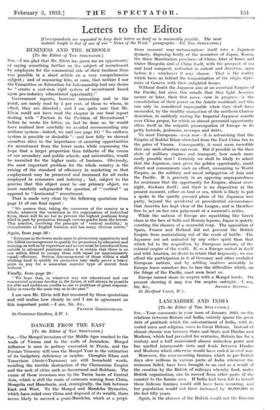Letters to the Editor
[Correspondents are requested to keep their letters as brief as is reasonably possible. The most suitable length is that of one of our " News of the Week" paragraphs.--Ed. TILE SPECTATOR.]
BUSINESS AND THE SCHOOLS
[To the Editor of THE SPECTATOR.]
SIR,—I am glad that Mr. Elvin has given me an opportunity of saying something further on the subject of recruitment by employers for the commercial side of their business than was possible in a short article on a very comprehensive Slit/lea ; and of reassuring him, at once, that neither I nor the C,oin/nittee on Education for Salesmanship had any desire to " create a cast-iron rigid system of recruitment based upon pre-industry educational opportunity."
Government reports, however interesting and to the point, are rarely read by 1 per cent, of those to whom, in effect, they are directed ; and I am quite sure that Mr. Elvin could not have read the chapter in our fugal report dealing with " Factors in the Problem of Recruitment " before he wrote his letter, as, had he done so, he would have realized how carefully we avoided recommending any uniform system—indeed, we said (sec page 31) " No uniform system is possible or desirable "—and how fully we showed ourselves alive to the importance of ensuring opportunities for recruitment from the lower ranks while expressing the hope that a larger proportion than hitherto of the cream of our• secondary and public schools, and universities, would be recruited for the higher ranks of business. Obviously, the most important problem for the whole country is the raising of the standard of efficiency in marketing so that employment may be preserved and increased for all ranks employed in commerce and industry ; but, subject to the proviso that this object must be our primary object, we most carefully safeguarded the question of " vertical " as opposed to " horizontal " recruitment.
That is made very clear by the following quotation from page 11 of our final report :
" We assume that, taking the commerce of the country as a whole, whatever the variations in the organization of individual firms, there will be no bar to prevent the highest positions being filled in part by promotion through various grades from the lowest. This practice, involving the principle of vertical mobility,' is characteristic of English business and has many obvious merits."
Again, from page 80 :
"Everyone in the lower ranks must be given every opportunity and the fullest encouragement to qualify for promotion by education and training, as well as by experience and no one must be introduced from outside to advanced positions unless it is certain that there is no one within fitted to occupy them with equal (or approximately equal) efficiency. Serious discouragement of those within a staff working hard to qualify for promotion may easily prove a heavy price to pay for a somewhat superior type of recruit from without."
Finally, from page 28 :
" We hope that, in whatever way our educational and our commercial systems develop in the future, it will always be possible for able and ambitious youths to rise to positions of great responsi- bility in exactly the same way as in the past."
I am sure Mr. Elvin will feel reassured by these quotations and will realize how closely he and I are in agreement on this important point.—I am, Sir, &e.,
28 Grosvenor Gardens, S.W. 1.
FRANCIS GOODENOUGH.




































 Previous page
Previous page